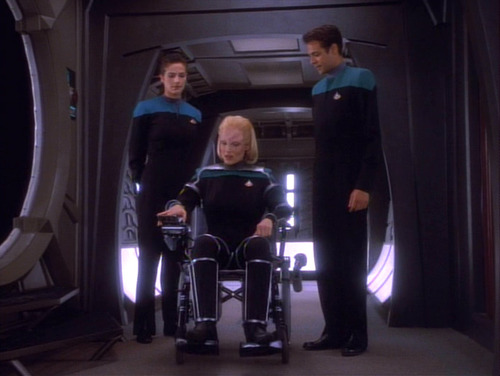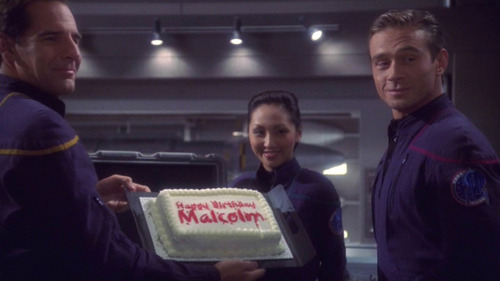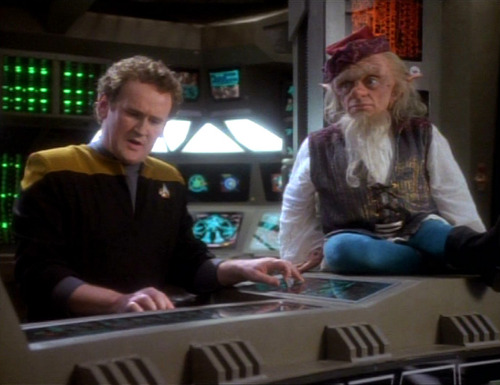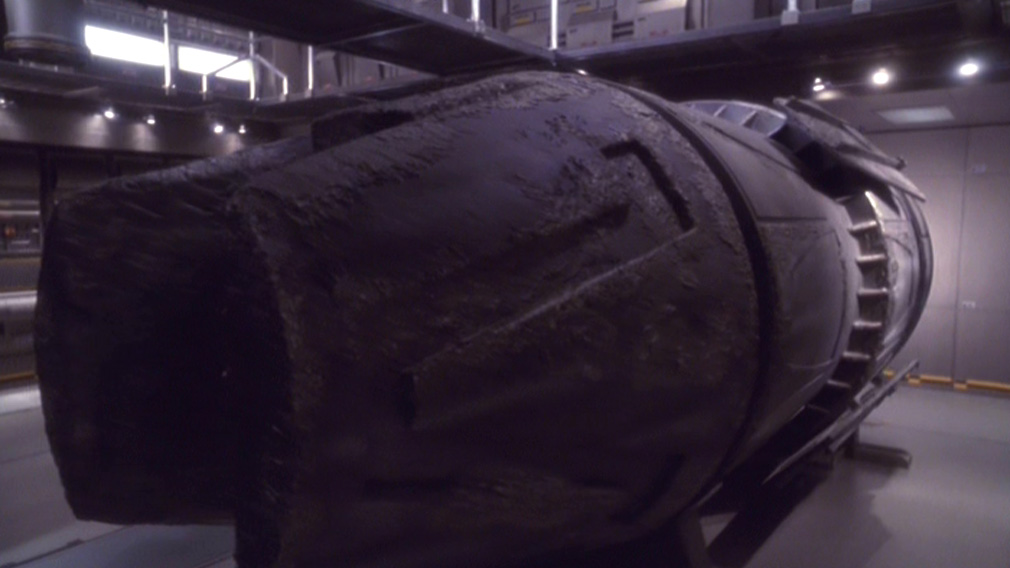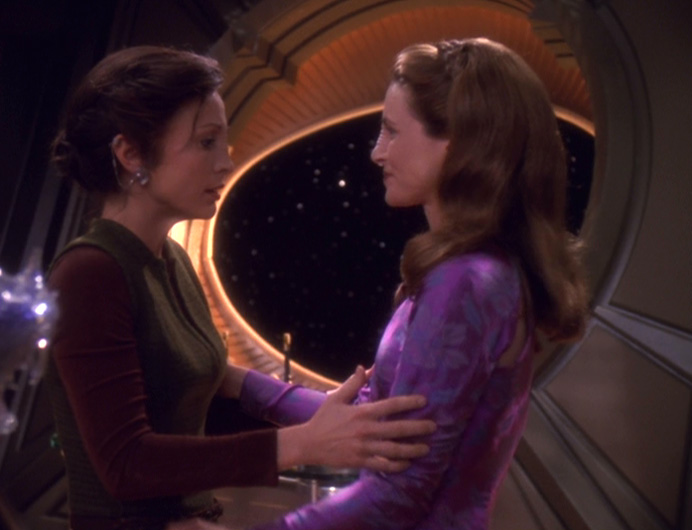“Melora” is another Star Trek episode that uses an allegory about an alien to comment on an issue in our human society. In this case, Ensign Melora Pazlar comes to Deep Space Nine. She is unable to walk unassisted because she comes from a planet with very low gravity.
The problem is, unlike TNG’s “The Outcast”, it’s really not clear what the message is that we’re supposed to take away from this episode.
Instead of doing a full episode play-by-play, I wanted to focus on a few key scenes featuring Melora, and look at what they say about people with disabilities and expectations about their relationships with non-disabled people.
1. Bashir can’t wait to meet Melora!
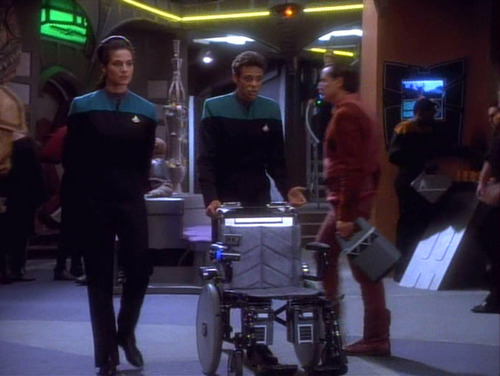
“Just think what she’s gone through to get here, Jadzia. What it must be like to adjust to our gravity after growing up on a planet with such low surface gravity,” Bashir effuses.
O’Brien says he’s got ramps set up in a lot of places but there will still be places she can’t access in the wheelchair. Dax asks why they can’t just use the transporter.
O’Brien: It makes sense to me, but she sent word that it wasn’t be acceptable to her.
Dax: I wonder why.
Bashir: I know exactly why. She went through the Academy the same way. Once her basic needs are met, she refuses any special assistance. She’s extraordinary.
There’s an implication here that people with disabilities are supposed to be self-reliant and avoid inconveniencing others…
2. But not too self-reliant
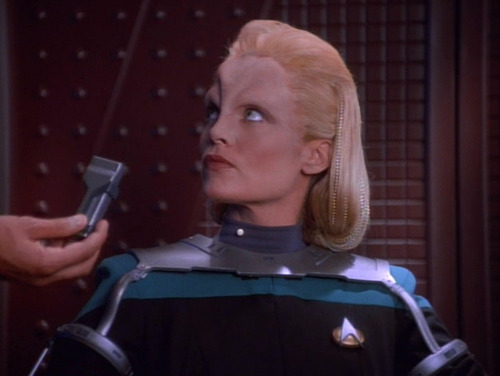
Turns out Melora has a big chip on her shoulder. She’s fed up with other people treating her as different and less capable, so she starts off a bit hostile to her new colleagues.
What she’s saying is totally understandable, though. When she meets Sisko she’s upset because the senior officers were discussing her mission without her. Sisko explains that’s normal and she replies:
Melora: I’m sorry if I seem overly sensitive, but I’m used to being shut out of the Melora problem. The truth is, there is no Melora problem until people create one. This may sound ungrateful, because Doctor Bashir has been wonderfully helpful in the preparations for my arrival, but frankly, I wonder why a medical opinion is necessary in this discussion.
Dax: Julian knows more of your capabilities than any of us.
Melora: I don’t need a medical opinion to tell me my own capabilities.
This makes sense and it’s a direct call-out of the medical model, which treats disability as an illness that needs to be cured.
Unfortunately, after her initial outbursts like this all the main characters get this look that seems to say, “Whoa! This lady is totally overreacting. What’s with the attitude?”
3. Inspirationally Disadvantaged
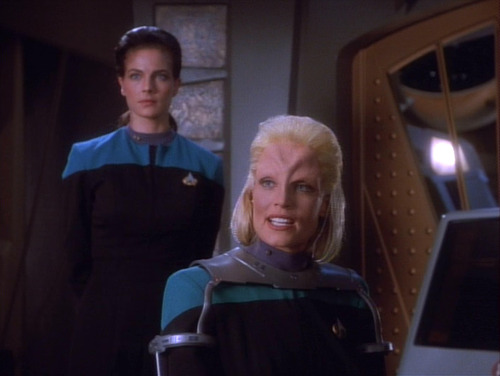
Later in that same scene Melora gives another speech:
Try sitting in the chair, Commander. No one can understand until they sit in the chair. I have been in one chair or another since I left my homeworld. My family gave me this cane. It’s made from the wood of a garlanic tree. They had no idea what it would be like to live off-world in what you consider normal gravity. Only a handful of Elaysians have ever left home. But I always knew that I had to be one of them. I dreamt about exploring the stars as a child, and I wasn’t going to allow any handicap, not a chair, not a Cardassian station, to stop me from chasing that dream.
This borders on a common disability trope, the “Inspirationally Disadvantaged” or “Magically Differently-Abled Person”.
It likely comes from good intentions, but one of the issues with this, according to TVTropes is: “it’s more than a little patronizing to portray a handicapped person as heroic for doing something the rest of us do all the time.”
4. The Doctor Finds a Way In
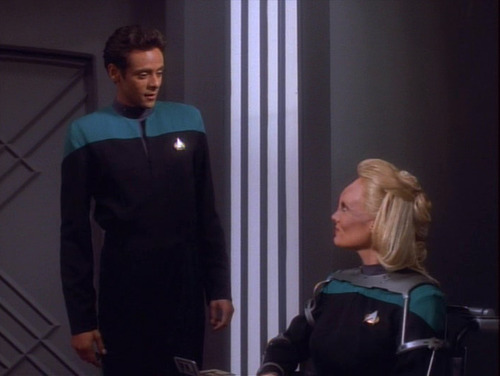
Bashir may tell her he’s no longer her doctor, but he’s still trying to fix her:
Bashir: Was that an attack? You see, you do it so well, with such charm, it’s hard to tell.
Melora: I really don’t mean to
Bashir: Sure you do.
Melora: I beg your pardon?
Bashir: Of course you mean to. All of these broad shots you fire it’s your way of keeping the rest of the universe on the defensive. Has to be. You’re too good at it.
He softens her up a bit and asks her to dinner. At the Klingon restaurant on the promenade, Melora surprises him by ordering in Klingon, definitely a good attempt to add a bit more complexity to Melora’s character.
5. Back to the Medical Model of Disability

Melora falls attempting to get into a section of the station where there are no ramps. Dax finds and helps her to the infirmary.
There, Bashir (who’s now her doctor again, apparently) treats her and tells her she needs to let herself be dependent on others sometimes.
As he walks her back to her quarters, he says he thinks he might be able to adapt some previous work on “neuromuscular adaptation” that might be able to strengthen her muscles enough that she doesn’t have to use the chair.
She lets Bashir into her quarters and turns down the artificial gravity. Then they kiss and make out. This is problematic because he’s her doctor again – he’s actually considering treating her disability! This part of the plot in general also goes right back to the good old medical model of disability, which sees the person as the problem (instead of the social model, which sees the problem in society failing to accommodate everyone).
6. “The Little Mermaid”

Even though the treatments are starting to work, Melora has second thoughts.
Melora: It’s starting to wear off again. I don’t understand myself. How could I possibly have second thoughts? This would mean real independence. It’s everything I ever wished for. But then I start to think about home and how I won’t be able to go back. Well, maybe just for a short visit, but never really go back.
Dax: The Little Mermaid.
Melora: Mermaid?
Dax: It’s an Earth fable by Hans Christian Andersen. She trades her magical life under the sea for a pair of legs to walk on land.
Melora: Didn’t she live happily ever after?
This gets at the idea that what might be seen as a disability can be part of who someone is – not something that can and should be “cured”.
Melora realizes how valuable she really is when she and Dax are taken hostage by a thuggish alien acquaintance of Quark’s (part of the B plot in this episode, which I won’t go into).
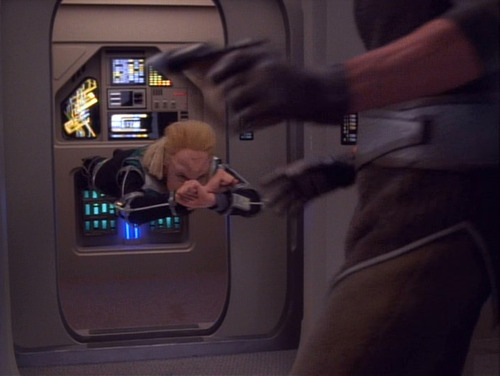
The baddie zaps her with a phaser, with Bashir and the crew in Ops watching via viewscreen, but somehow she revives. She turns off the gravity on the runabout and launches herself into the bad guy, saving the day.
It’s a neat little twist on what could’ve been a very damsel-in-distress-y scenario. It’s also cool that what had been her disability was used in a powerful way. Unfortunately, it was kind of undermined by the explanation of why she survived the phaser blast: because of the neuro-stimulants she’d been receiving as part of her treatments to “fix” her disability.
7. Melora and Bashir Part Ways
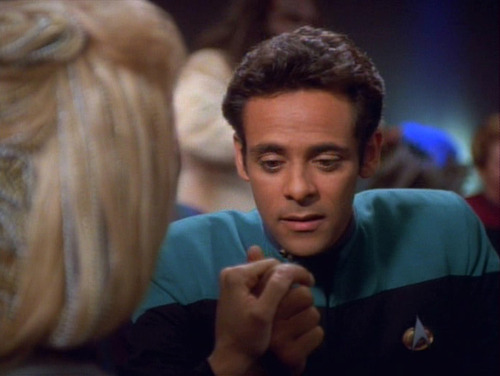
Bashir and Melora have the final scene back in the Klingon restaurant. Bashir looks soooo disappointed that Melora has decided not to finish the treatments. Melora replies: “I like being independent, but to give up everything that I am to walk on land…Well, I might be more independent but I wouldn’t be Elaysian anymore. I’m not sure what I’d be. Besides, maybe independence isn’t all it’s cracked up to be. I kind of like how it feels to depend on someone for a change. And I’m glad you got me to unlock the doors to my quarters so I could finally let someone into my life.“
And then we never hear Bashir mention her again for the rest of the series.
In summary, “Melora” was written by Evan Carlos Somers (and re-written by others), who himself uses a wheelchair. Somers said, “I always thought it would be nice to create a disabled character who’s accepted for what she is and doesn’t have to change…The best way to do that on Deep Space Nine was to have Bashir find a cure for the disability, and for the character to turn it down. That was the real driving force behind my wanting to do this episode.”
That’s awesome, but that message didn’t come through clearly to me. I saw that she doesn’t have to change her disability but she does have to change her attitude. Ultimately that personal transformation to being more “dependent” is what ties the story together, not the reaffirmation of her uniqueness.
There’s also the unfortunate fact that her relationship with Bashir can’t continue after she decides not to finish the treatments.
But ultimately, no matter what happened in this episode, you’re always going to have problems using a single character as a stand-in for an entire group of people. And in a one-off episode where the disability is the focus of the plot, it’s hard to see the full person.
What we need are more people with disabilities in TV shows generally, playing recurring roles and a range of parts. For contrast to Melora, look at the much fuller picture we get of Geordi LaForge. Without more roles, you can’t really ever do justice to the incredibly diverse group of people with disabilities.
P.S. For more analysis of this episode check out Episode 38 of the podcast I co-host – Women at Warp: A Roddenberry Star Trek Podcast, in which we talk about disability and ableism in Star Trek.
Bechdel-Wallace Test: Pass. Dax and Melora talk about Vulcan music in the runabout, though it’s just an intro to eventually talking about Bashir and possibilities for “subspace relationships”.







